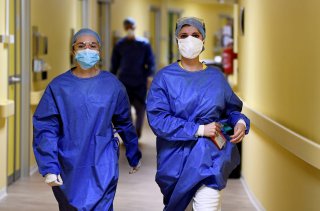The Time Is Now: We Must Expand America's Health System to Combat the Coronavirus
These economic insights can help to guide policy in its effort to encourage expansions of key elements of the health system’s capacity.
The COVID-19 crisis will significantly strain the health system’s capacity. In early hotspots, significant strains are already apparent. Testing capacity has lagged significantly from the outset. Treatment capacity risks being overwhelmed as the virus spreads. This makes a rapid expansion of key elements of the health system’s capacity an important piece of our response to the crisis.
The following economic insights can help to guide policy in its effort to encourage expansions of key elements of the health system’s capacity:
- Clear price signals matter. Send clear signals that new ventilators, beds, and tests will be generously reimbursed. Private industry tends to respond rapidly to well-defined opportunities to profit by fulfilling social needs.
- Light–touch regulation will hasten the expansion of capacity for new medical equipment and structures (e.g., ventilators and structures to house new beds). We should not let the perfect be the enemy of the good when good is far better than nothing.
- It is more important to maintain strict standards for the quality of diagnostic tests than for the quality of equipment and structures. False positive and false negative tests can worsen strains on other aspects of the system. Tests with high error rates can be worse than no tests.
- Entry barriers like licensing costs reduce the supply of medical personnel. Physicians and nurses should not be inhibited from taking their practices to cities and states in greatest need. Recently retired physicians and nurses should face minimal hurdles in returning to work.
- Higher payments increase supply. Efforts to expand supply by relaxing licensing requirements will be enhanced if accompanied by higher wages or higher reimbursement rates.
- Wages need to compensate for changes in risks faced on the job. Medical staff are currently underpaid because they are not being compensated for the increase in risk they face. Higher payments may help to prevent medium-run burnout even if they do not induce short-run increases in work hours.
This list of economic insights can be translated into actionable policies. Following is a set of policy actions that are consistent with these insights:
- Use Medicare’s payment system to augment reimbursements for a) COVID-19 tests and b) hospitals that install new ventilators and beds. This will encourage new capacity to be brought online. Some creativity may be required to work within Medicare’s existing payment setting rules. Cost-based payments, for example, can be adjusted to account generously for the fact that costs will tend to rise as we seek to expand capacity by both moving up the supply curve and shifting the supply curve out.
- Empower an ad hoc panel of experts to rapidly assess whether newly manufactured ventilators and newly installed hospital capacity are “serviceable.” The panel should have representation from the medical community and manufacturers. The “serviceable” standard should be less stringent than regulatory standards applied during non-crisis times.
- Expedite the review of new tests and, of course, potential treatments and vaccines. Reduce red tape for the deployment of novel testing procedures (e.g., test pooling and at-home testing).
- Relax entry barriers to ensure that retired physicians and nurses can return to work and that medical personnel can relocate seamlessly to cities and states in greatest need.
- Enact temporary, across the board, increases to Medicare’s payment rates.
Together, these policies can send a clear signal to manufacturers, scientific researchers, and medical personnel: More capacity is needed and will be rewarded.
Jeffrey Clemens is an associate professor of economics at the University of California at San Diego, a faculty research fellow at the National Bureau of Economic Research, and a CESifo Research Network Fellow.
This article by Jeffrey Clemens first appeared at the American Enterprise Institute.
Image: Reuters

